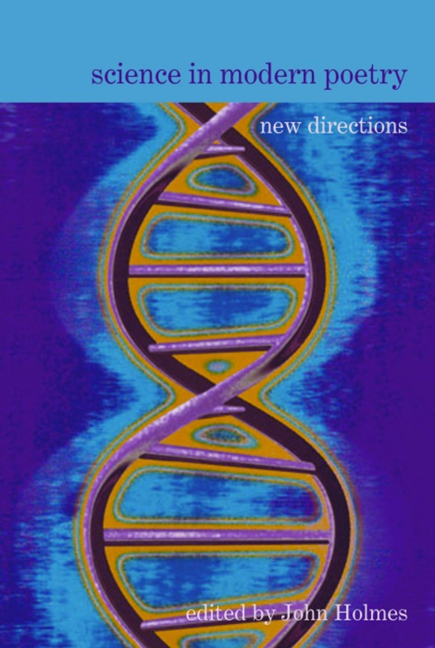Book contents
- Frontmatter
- Contents
- List of Contributors
- Acknowledgements
- Introduction
- Part I Science and Contemporary Poetry: Cross-Cultural Soundings
- 1 The Function of Antagonism: Miroslav Holub and Roald Hoffmann
- 2 Cutting and Pasting: Language Writing and Molecular Biology
- 3 The Poetics of Consilience: Edward O. Wilson and A. R. Ammons
- 4 Poetry, Science and the Contemporary University
- Part II Science in Modernist Poetry: Appropriations and Interrogations
- Part III Darwinian Dialogues: Four Modern Poets
- Afterword
- Bibliography
- Index
4 - Poetry, Science and the Contemporary University
from Part I - Science and Contemporary Poetry: Cross-Cultural Soundings
- Frontmatter
- Contents
- List of Contributors
- Acknowledgements
- Introduction
- Part I Science and Contemporary Poetry: Cross-Cultural Soundings
- 1 The Function of Antagonism: Miroslav Holub and Roald Hoffmann
- 2 Cutting and Pasting: Language Writing and Molecular Biology
- 3 The Poetics of Consilience: Edward O. Wilson and A. R. Ammons
- 4 Poetry, Science and the Contemporary University
- Part II Science in Modernist Poetry: Appropriations and Interrogations
- Part III Darwinian Dialogues: Four Modern Poets
- Afterword
- Bibliography
- Index
Summary
My last contact with the Irish-American poet Michael Donaghy occurred not long before his death in 2004. Donaghy agreed to take part in a project I was organising on ‘Contemporary Poetry and Contemporary Science’, and met Professor Kevin Warwick, a ‘cyborg researcher’ who had had a silicon chip transponder surgically implanted in his left arm. Michael was taken aback by all this, but gave as good as he got. Writing a poem in response to the experience of meeting this scientist, he entitled it ‘Grimoire’. A grimoire is a magician's manual for invoking demons – hardly a familiar word nowadays. As Professor Warwick honestly responded when he first saw the poem, ‘“Grimoire”. What the hell did that mean?’ (Crawford, ed., 2006, 48). Like many other poets, Michael Donaghy delighted in the ability of poetic language to conjure. Yet when he met a man who seemed to him a scientific conjuror, he was unsettled. Poets and scientists are sometimes more surprised by similarities between their activities than by differences. Yet often they develop an innate respect for the distinctions that remain between poetry and science, distinctions that academia ought to respect, though not necessarily to regard as in every sense absolute.
Kevin Warwick writes of working with Michael as ‘a deeply moving experience’ and of how ‘Through Michael's words I was able to look at myself in a ten-dimensional space’. He also goes on to say, ‘I will press ahead even if others are horrified’ (Crawford, ed., 2006, 49). Like Miroslav Holub, Michael Donaghy contributed to the book of essays and poems Contemporary Poetry and Contemporary Science but died before it appeared and so became also one of the people to whom that volume is dedicated. Of all the poets, academic literary critics and university scientists who met and worked together in the making of the book, Michael produced probably the most sophisticatedly uneasy response, and its complexly nuanced unease makes it memorable. So it seems appropriate to invoke his work at the start of an essay on poetry, science and the contemporary university, and, at the end of this essay, to return to the final, short section of ‘Grimoire’.
- Type
- Chapter
- Information
- Science in Modern PoetryNew Directions, pp. 67 - 84Publisher: Liverpool University PressPrint publication year: 2012



